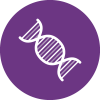About
MonoGutHealth is an Innovative Training Network (ITN) funded by the European Commission under the Horizon 2020 Marie Skłodowska-Curie Action. The main objective of MonoGutHealth is to train young researchers in international interdisciplinary research using innovative methodologies that focus on novel nutritional approaches in pigs and chickens, prior to birth and/or in the early neonatalRelating to newborn individual./post-weaning period, to optimise the gastrointestinal tractThe part of the digestive system that consists of the stomach and intestines. (GITThe part of the digestive system that consists of the stomach and intestines.) development and microbial colonisation resulting in more resilient pigs and chickens.
The training will expose the early stage researchers (ESR) to various state-of-the-art methodologies, give them an opportunity to get well-monitored first experience in research in teams led by enthusiastic researchers at the cutting edge of animal science technologies.
Methods
11 early stage researchers will carry out comprehensive and industry-relevant, interdisciplinary research that, by tackling the proposed research questions from different angles, will deliver new knowledge, innovative technologies and tools to produce resilient pigs and chickens, which are the two most economically important livestock species worldwide.
Specifically, ESR projects will explore the efficiency of innovative feeding strategies prior to birth and/or during the early neonatalRelating to newborn individual. periods to improve the development of the gastrointestinal tractThe part of the digestive system that consists of the stomach and intestines. and its microbiomeThe diverse consortium of bacteria, archaea, fungi, protozoa, viruses, and their collective genome f… and thereby enhancing resilience to pathogen challenges.
The innovative ESR projects...

- This will be done through the core training at their host institutions, network-wide advanced research training and secondments.

- This will be done by proposing viable nutritional solutions to optimise the development of poor performing pigs and broilers thereby improving their survival and welfare.

- This will be done by proposing best nutritional strategies for optimal GIT development and GIT microbial colonization in early life.

- This will be done by proposing solutions for the sustainable production of disease resilient pigs and poultry.
Learn about ESRs in more details
MonoGutHealth approach
The novelty of the MonoGutHealth approach is that it exposes ESRs to new knowledge on the importance of early-life colonization and establishment of the microbiomeThe diverse consortium of bacteria, archaea, fungi, protozoa, viruses, and their collective genome f… in the GIT for later development and health.
The consortium is convinced that this provides a yet largely unexploited opportunity to substitute for the prophylactic use of antibiotics, Zn and Cu currently used to treat livestock health issues, which can reduce the build-up of antimicrobial resistanceMicroorganisms’ ability to withstand antimicrobial treatments. Antibiotic overuse or misuse has been… and improve the sustainability of livestock production.
MonoGutHealth will offer the ESRs insights into alternative approaches, rather than traditional ones (e.g. genetics and manipulation of postnatal environment), which can be exploited to improve animal health and growth in a sustainable manner.
At the end of their projects, early stage researchers (ESRs) will not only have a profound knowledge in their own research field (through their project, as usually acquired in a conventional PhD project) but already at the early stage of their careers they will have benefited from the interdisciplinarity of the multisectoral network by
- participating in the project-specific meetings
- attending the training courses for advanced research and transferable skills
- completing meaningful secondments to industry partners
- actively contributing to national and international dissemination, communication, exploitation and outreach activities.
To this end, a new ‘breed’ of researchers equipped with a novel skillsets, knowledge and experience will be able to seamlessly cross the traditional discipline boundaries and implement the most appropriate tools required to comprehensively answer pressing current and future challenges of the pig and poultry production.